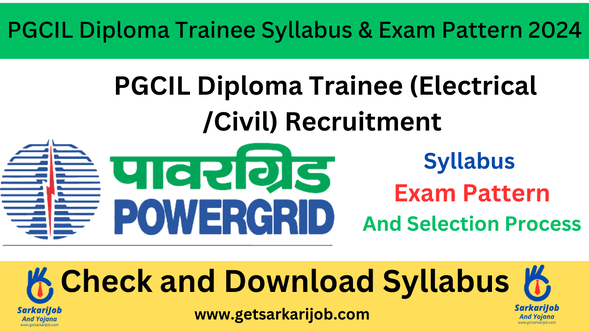The PGCIL determines the PGCIL Diploma Trainee Syllabus & Exam Pattern for the Computer-Based Test (CBT). Candidates preparing for the PGCIL Diploma Trainee Exam should familiarize themselves with these details to strategize their preparation effectively, considering the marking scheme, subject-wise weightage, and other essential aspects.
Here are the key points to note about the PGCIL Diploma Trainee Syllabus & Exam Pattern :
- It is crucial for candidates to understand the exam structure and syllabus to plan their preparation efficiently.
- The exam includes both technical (discipline-specific) and non-technical sections like reasoning, quantitative aptitude, and English language skills.
- Knowing the subject-wise distribution of marks and the overall marking scheme is essential for managing time and focus during preparation.
The Computer-Based Test (CBT) for the PGCIL Diploma Trainee Exam is conducted for a total of 170 marks. According to the PGCIL Diploma Trainee Exam Pattern:
- Each correct answer awards 1 mark.
- For every incorrect answer, 1/4th of a mark is deducted as a penalty for negative marking.
Candidates should be mindful of this marking scheme to maximize their scores by avoiding guesswork and focusing on accuracy.
PGCIL Diploma Trainee Syllabus 2024
The PGCIL Diploma Trainee Exam is divided into two parts:
- Part I : Technical/Professional Knowledge in the relevant field.
- Part II : Aptitude Test covering vocabulary, verbal comprehension, data sufficiency, interpretation, reasoning ability, quantitative aptitude, and numerical ability.
Given below is a detailed description of the PGCIL Diploma Trainee Syllabus.
PGCIL Diploma Trainee Syllabus for Electrical
These topics are typically part of the Technical Knowledge/Professional Knowledge section for the PGCIL Diploma Trainee (Electrical) exam. Here’s the topics and detailed breakdown of the syllabus:
| Topics | Syllabus | ||
| Network Theory |
| ||
| DC Machine, AC Machine & Transformer |
| ||
| Power Electronics & Drives |
| ||
| Microprocessor |
| ||
| Analog Circuits/Electronics |
| ||
| Digital Electronics |
| ||
| Electrical Measurements & Measuring Instruments |
| ||
| Generation, Transmission & Distribution of Electrical Power |
| ||
| Control Systems |
| ||
| Electrical Basics |
| ||
| Electrical Engineering Materials |
| ||
| Circuit Theory |
| ||
PGCIL Diploma Trainee Syllabus for Civil
This detailed breakdown provides a comprehensive understanding of each subject for the PGCIL Diploma Trainee (Civil) exam. Candidates should cover all these topics for thorough preparation.
| Topics | Syllabus | ||
| Civil Engineering Materials and Construction |
| ||
| Solid Mechanics and Structural Analysis |
| ||
| Concrete Technology |
| ||
| Reinforced Concrete Structures |
| ||
| Steel Structures |
| ||
| PSC (Prestressed Concrete) Structures |
| ||
| Fluid Mechanics |
| ||
| Hydrology & Water Resources Engineering |
| ||
| Hydraulic Structures |
| ||
| Soil Mechanics and Foundation Engineering |
| ||
| Transportation Engineering |
| ||
| Environmental Engineering |
| ||
| Surveying |
| ||
| Bridge Engineering |
| ||
| Estimation, Costing, and Specifications |
| ||
| Construction and Project Management |
| ||
| Environmental Studies |
| ||
PGCIL Diploma Trainee Syllabus for Quantitative Aptitude
| Subject | Topics | |
| Quantitative Aptitude |
| |
PGCIL Diploma Trainee Syllabus for Reasoning
| Subject | Topics | |
| Reasoning |
| |
PGCIL Diploma Trainee Syllabus for English
| Subject | Topics | |
| General English |
| |
PGCIL Diploma Trainee Exam Pattern 2024
The PGCIL Diploma Trainee Exam consists of a single stage: the Computer Based Test (CBT), which is crucial for candidate selection based on exam scores. Key details about the CBT are:
- Total Questions : 170 (1 mark each)
- Negative Marking : ¼ mark deducted for each wrong answer; no penalty for unattempted questions.
- Sections : Part I includes 120 discipline-specific questions; Part II includes 50 aptitude questions.
- Duration : 2 hours.
| Parts | Type of Paper | Type of Test | Exam Duration | Total No. of Questions | Total marks | Negative Marking |
| 1. | Objective Type Questions | Technical Knowledge Test/ Professional Knowledge Test | 2 Hours | 120 | 120 | 1/4th mark deducted for every incorrect answer |
| 2. | Supervisory Aptitude Test | Objective Test | 50 | 50 |
Candidates who score above the minimum required marks in the examination will advance to the document verification process. Upon successful verification, they will be offered the Diploma Trainee position in their respective discipline.
| Download Syllabus | Click Here |
| Join Our Official Channels | WhatsApp | Telegram |
| Home Page | Click Here |

